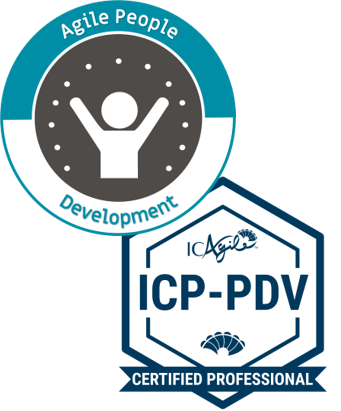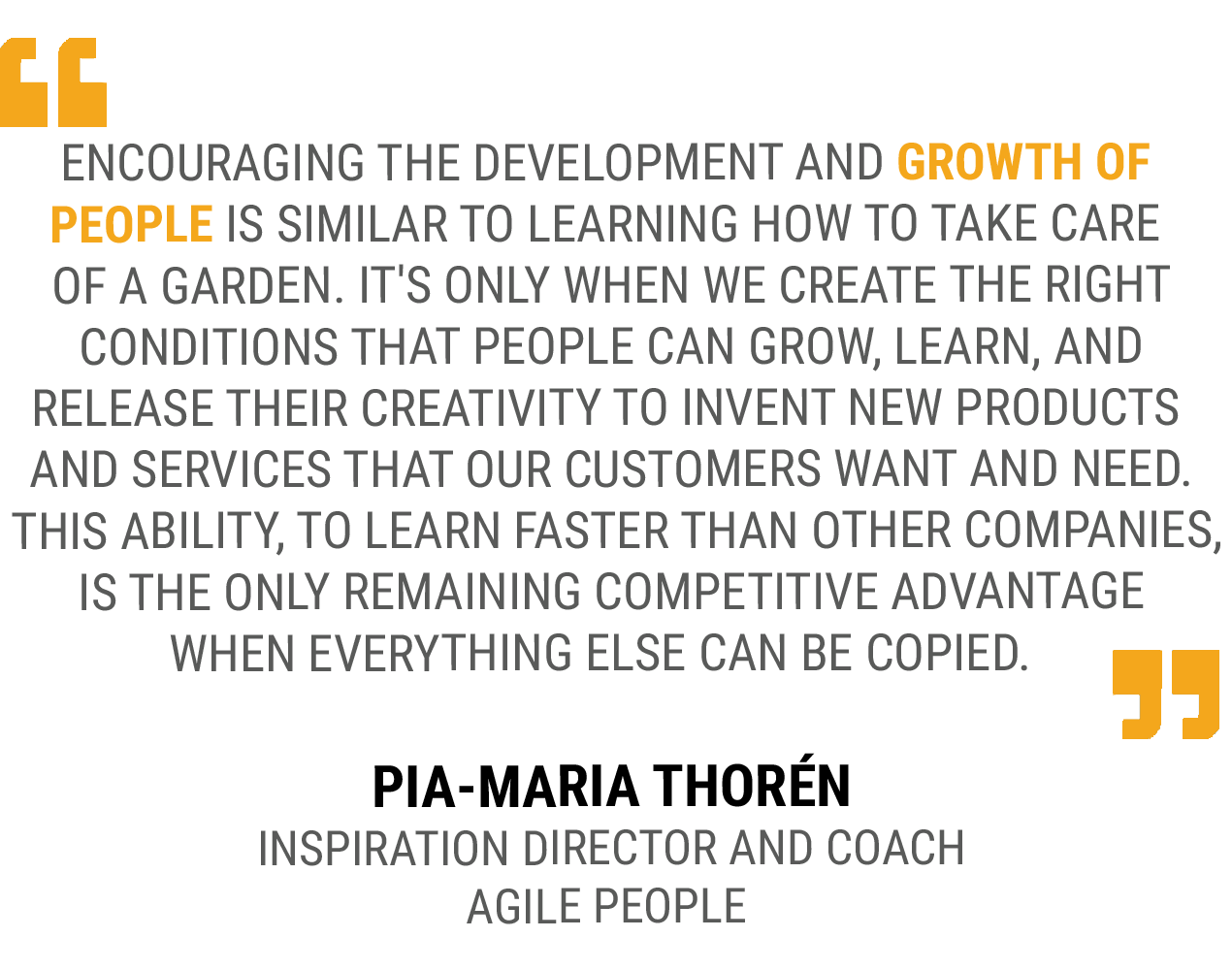
Early Bird:
Country Category 1: Euro 995
Country Category 2: Euro 893
Country Category 3: Euro 714
Regular:
Country Category 1: Euro 1170
Country Category 2: Euro 1050
Country Category 3: Euro 840

Early Bird:
Country Category 1: Euro 995
Country Category 2: Euro 893
Country Category 3: Euro 714
Regular:
Country Category 1: Euro 1170
Country Category 2: Euro 1050
Country Category 3: Euro 840

Feedback from participants in Pia-Maria’s last course:
For organizations to succeed with business agility, formal leadership and management roles must evolve to focus on creating a supportive and empowering environment for ongoing learning and development. This begins with the leader’s decision to continue growing both themselves and others in order to continuously empower and develop people and teams. This comes from the ability to step into a stance of leader, coach, and mentor and letting go of the need to be seen as an “expert.” Agile leaders and managers need to encourage and enable continued growth and development while modeling an agile/growth mindset. They look to create environments where individuals, teams, and team of teams thrive.
The ICP-PDV Learning Outcomes focus on leaders at various levels of organizations and their relationship to empowering people as a leader — not as much on the processes that support “people management” and “performance management.” Those processes are addressed more thoroughly in the Agility in HR (ICP-AHR) Learning Outcomes.
Leaders who take this course will come away with key knowledge and practical applications to enable high-levels of organizational success by unlocking the potential in people and teams. They will also come away with tools to counter the demotivation and disengagement that plagues some organizations.

Explain the fundamental ingredients for a human-centric culture that enables continuous development and learning. Identify gaps in their own organization and contrast different approaches to shifting to a more development-oriented culture.
Conduct a self-assessment as it relates to personal development needs. Identify tendencies that may block or foster development. Prepare a roadmap for self-development in these areas.
Compare and contrast elevating and delegating behaviors. Apply these concepts to their own context.
Apply several techniques to create an environment for individual development, explain why these techniques work from a neuroscience perspective, then identify ways they can apply these to themselves and their organization.

Demonstrate techniques that help surface an individual’s strengths, passions, interests, etc., and explain how you would approach a scenario where an individual’s development path does not align with the organization’s needs.
Apply techniques for developing leadership in others in a way that leaves space for them to adopt their own authentic style. Demonstrate advanced techniques for providing feedback and approaching difficult conversations.
Show through examples and their own experience how self-organization and team development are inherently linked. Show the leader’s role in encouraging self-organization and continuous learning.

Explain potential impediments to team success and describe ways to balance individual, team, and organizational factors to maximize development at all three levels.
Describe techniques that can help create a safe culture for continuous learning and high-performance. Explain the power of bringing diverse experiences to the table.
If you miss some sessions, feel free to join any of the other courses for 2021 for that particular session – here is the whole schedule for 2021:
Start next course: August 2nd, 2021
Session D1: Introduction to Agile People Principles and the Online Training setup
The foundation of Agile Peoples’ mindset is about the principles, values, methods, and tools that we need to start using to release competence and innovation – and what we stop doing. This session is an introduction to each other and how we run the training.
Session D2: Types of Learning and the Effect on the Culture
Individual agility influences organizational agility. Here, we describe ways to increase engagement within organizations. Assessing the culture, we recommend how to create a continuous learning culture. What are the factors that would promote vs detract from this kind of culture?
Session D3: Being a Role Model for Continuous Development
Evaluation of your personal attitudes towards learning and the importance of self-development and the development of others within the organization. Unlearning existing knowledge and beliefs becomes important in order to create opportunities for new learning to happen. The insight that learning is an organizational competency, tied to certain behaviors of people – how can we avoid the wrong behaviors and amplify those that support a learning culture?
Session D4: Delegating Outcomes and Hiring to Elevate
Focusing more on delegating outcomes than delegating tasks impacts learning and development in the organization. How can we delegate and what delegation techniques are there? How do we limit the way we delegate responsibility and decision making? Contrast hiring to elevate vs. hiring to delegate and provide examples of where hiring to elevate has been done.
Session D5: Early Focus on Motivation and Brain-Based Learning
Learning in your own way starts early in the onboarding process when joining a new team. Your motivational factors will decide within what areas and how you would like to develop yourself. The SCARF-model helps to understand how your brain works and what learning techniques work with your brain, not against it. What is the difference between you and other team members and how can you overcome these in order to work well together?

Explaining here how to co-create development plans and how to encourage individual ownership of development. What tools can be used in self-evaluation with individuals and teams in your organization to identify strengths, passions, and interests? How to link personal development plans to align with organizational needs and what happens when personal and company goals do not align?
Session D7: Everybody needs to be a Leader and find their Unique Style
Leadership at every level is necessary and valuable in an agile organization. Self-leadership becomes a must for every employee, and for most people, it’s also about helping to lead others. Finding your own leadership style is essential – you need to be authentic. Here, we also learn how to approach difficult conversations that challenge behavior without undermining the dignity of the individual.
Session D8: Self-organizing for Collective Outcomes in a Suitable Environment enables Team AccountabilityWe learn here why self-organizing can make the team move quicker through team development stages and what leadership skills are required to speed up the process, but also shape the environment. Different physical environments impact a team’s ability to collaborate and learn towards a common, collective purpose when moving through team development stages.
Session D9: Providing Effective Feedback and setting up the Team to Succeed in the Larger System
We look at how to encourage open, multi-directional, and timely feedback within teams and how teams can relate and be visible in the larger organization. What impact could organizational conditions, such as imperative structures have on the team and the relationships between team members? What scenarios are there and when should we intervene.
Session D10: Diversity, psychological safety and conflicts in teams
There are many benefits of diverse teams over homogenous teams and if there is psychological safety, cognitive diversity can maximize collaboration conditions. We examine how working together can create more value, when we have a trusting, safe team environment. What are the leadership qualities that become important here and how can leaders contribute to creating a climate of healthy conflict?
This certification was specifically designed for leaders where one or more of the following criteria apply:
If you attend a course that is delivered online we are working with Zoom for interactive discussions and team exercises, Mural as the digital canvas, and Slack for communication between the sessions.
You get access to a Learning Management System for your participants (agilepeople.com/campus) that contain an overview and detailed information about videos, articles, documents, and case stories for all sessions including links to all of the tools used in the training.
There will be some work to be done after every session, so add about 5 hours more every week. Course literature and material will be sent to your location and distributed digitally. The certification assignment will be accomplished in the time between the sessions so that you will be ready on the day of the last session.
Your course leader and facilitator is Manfred van Veghel
Manfred van Veghel, has 30 years of training and consultancy experience from large Dutch and international companies for Agile, HR, Leadership and Organization. He is the founder of the Agile Caribbean Meetup Group and has a global network of Agile People.
As a consultant he has worked with Agile since 2001 at ABN AMRO (DSDM) with several frameworks, Agile Project Management, DevOps, Scrum, Kanban, SAFe, Agile HR, Lean Leadership & Kaizen, from the Healthcare sector to ICT and governmental organizations in Europe, US and on different Caribbean islands.
He was involved as Agile Coach for the Agile HR transition of ING HR from 2015 – 2017, one of the biggest Agile HR transitions of its kind. Currently he involved in Agile Transitions in the Caribbean.
If you should have to cancel your registration, notification in writing should be sent to info@agilepeople.com. Please make sure you state the name of the conference/event in the subject line of your email.